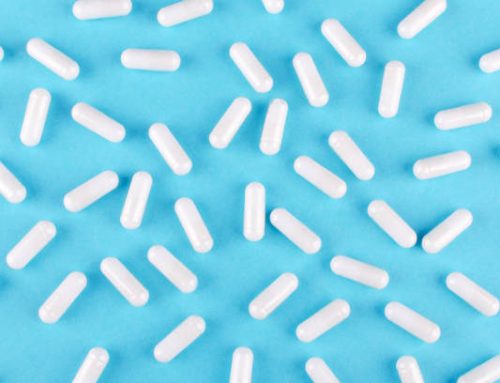Are you feeling exhausted, drained, or mentally foggy? Your body may be lacking a crucial nutrient that is essential for your well-being – thiamin. Also known as vitamin B1, thiamin plays a vital role in the metabolism of carbohydrates, the production of energy, and the functioning of your brain and nervous system. Without enough thiamin, you may experience symptoms like fatigue, weakness, depression, and even memory loss. But worry not, because in this article, we’ll explore how you can thrive with thiamin and unleash your full potential. Energize your body and mind, and reclaim your vitality with the power of this underrated nutrient.

1. The Power of Thiamin: How This Essential Vitamin Can Help You Thrive
You may have heard of thiamin, also known as vitamin B1, and its importance for maintaining a healthy nervous system and converting food into energy. But did you know that thiamin can also have a significant impact on your overall well-being and quality of life? Here’s how:
1. Boosts Energy Levels
Thiamin plays a crucial role in converting carbohydrates into glucose, which is your body’s primary source of energy. Without enough thiamin, your body may struggle to produce energy, leaving you feeling fatigued and lethargic. By ensuring that you get enough thiamin through your diet or supplements, you can give your body the fuel it needs to thrive.
2. Enhances Brain Function
Thiamin is essential for the proper functioning of your nervous system, including your brain. Research suggests that thiamin may help improve cognitive function, memory, and attention span. It also plays a role in mood regulation, and low levels of thiamin have been linked to depression and anxiety.
3. Supports Heart Health
Thiamin helps regulate the contraction and relaxation of your heart muscle, keeping your heart beating steadily and efficiently. It also supports healthy blood flow and can help lower your risk of heart disease.
4. Helps Regulate Digestion
Thiamin is necessary for the proper functioning of your digestive system, including the breakdown and absorption of nutrients. It can also play a role in regulating your appetite, helping you maintain a healthy weight.
How to Get Enough Thiamin
Thiamin is found in a variety of foods, including whole grains, fortified cereals, meats, fish, legumes, and leafy green vegetables. However, if you’re not getting enough thiamin through your diet, you may benefit from taking a thiamin supplement. It’s essential to talk to your doctor before starting any supplement regimen, as they can help you determine the right dosage and ensure the supplement won’t interact with any medications you’re currently taking.
Remember, thiamin is just one of many essential vitamins and nutrients that your body needs to function at its best. By taking care of your body through a balanced diet and supplementation when necessary, you can unlock your body’s full potential and thrive in all areas of your life.
2. Nourishing Your Body and Mind: The Benefits of Thiamin for Energy and Mood
Are you feeling tired and low on energy? Have you been struggling to maintain a positive mood? If so, you may be lacking in thiamin – an essential nutrient that plays a crucial role in supporting your physical and emotional well-being.
Thiamin, also known as vitamin B1, is one of the eight B-complex vitamins that help your body convert food into fuel for energy. Without enough thiamin, your cells can’t produce the energy they need to function optimally, leaving you feeling sluggish and fatigued. But that’s not all – thiamin also plays a critical role in your mental health by supporting your brain function and enhancing your mood.
The Benefits of Thiamin for Energy
- Boosts metabolism: Thiamin helps your body break down carbohydrates into glucose, which is used by your cells as fuel for energy. By supporting your metabolism, thiamin can help you feel more energized and alert.
- Enhances exercise performance: Thiamin plays a key role in muscle contraction and nerve function, which are essential for athletic performance. Supplementing with thiamin may help boost your endurance, power, and speed.
- Supports cardiovascular health: Thiamin helps regulate your heart rate and blood pressure, which are important for maintaining a healthy cardiovascular system. By supporting your heart health, thiamin can also improve your energy levels and physical stamina.
The Benefits of Thiamin for Mood
- Relieves stress and anxiety: Thiamin helps regulate your nervous system and supports your brain function, which can help reduce symptoms of stress and anxiety. By maintaining healthy levels of thiamin, you may experience a greater sense of calm and peace.
- Improves cognitive function: Thiamin supports your memory, focus, and concentration, which are essential for mental clarity and productivity. By boosting your brain health, thiamin can enhance your cognitive performance and creativity.
- Enhances mood and happiness: Thiamin plays a crucial role in the production of serotonin – a neurotransmitter that regulates your mood and emotions. By supporting healthy levels of serotonin, thiamin can boost your feelings of happiness and well-being.
In conclusion, thiamin is a vital nutrient that supports your energy, mood, and overall health. Whether you’re an athlete or a busy professional, supplementing with thiamin can help you feel more energized, focused, and positive. Talk to your healthcare provider about how you can incorporate thiamin-rich foods or supplements into your daily routine and start reaping the benefits of this amazing nutrient today!
3. Discovering the Best Sources of Thiamin: Foods and Supplements to Fuel Your Life
Thiamin, also known as vitamin B1, is an essential nutrient that is vital for the body’s overall well-being. It is responsible for the proper functioning of organs, muscles, and the nervous system. Moreover, thiamin plays an essential role in converting food into energy, so it is crucial to incorporate it into your diet to maintain a healthy lifestyle. In this post section, we will explore the best sources of thiamin- foods and supplements that will fuel your life.
1. Foods Rich in Thiamin
Foods that are high in thiamin include whole grains, nuts, and seeds. These foods can be incorporated into your diet in various ways, such as baked into bread or snacks. Legumes, such as beans and lentils, are also excellent sources of thiamin, as are fortified breakfast cereals.
- Whole Wheat Bread
- Sunflower Seeds
- Black Beans
- Green Peas
- Fortified Breakfast Cereals
2. Thiamin Supplements
While it’s always best to consume nutrients through food, a thiamin supplement can help ensure that you are getting enough of this essential vitamin. Talk to a healthcare professional before starting any supplement. Thiamin supplements come in various forms, such as capsules, tablets, and liquid drops.
- Thiamine HCL Capsules : This supplement contains 500mg of thiamin HCL per serving and is suitable for vegans and vegetarians.
- Thiamin Vitamin B1 Drops : These drops are ideal for those who may have trouble swallowing capsules or tablets. They contain 1mg of thiamin and are suitable for vegans.
- Thiamin Vitamin B1 Tablets : These tablets contain 100mg of thiamin per serving and are suitable for vegans and vegetarians.
Adding more of these foods into your diet and supplementing with thiamin can improve your overall health, energy levels, and brain function. Whether you are a professional athlete or just someone looking to boost their energy levels, incorporating thiamin-rich foods and supplements can help you perform your best and lead a healthier life.
4. From Fatigue to Focus: Real-Life Success Stories of Thriving with Thiamin
Thiamin, also known as Vitamin B1, is an essential nutrient that plays a crucial role in our body’s metabolism. It is essential in converting food into energy and maintaining healthy nerves and muscle function. Oftentimes, we take this vitamin for granted, not realizing how vital it is to our overall well-being.
But what happens when we lack thiamin in our diet? The answer is simple: fatigue, memory loss and lack of focus. Thankfully, taking thiamin supplements can reverse this problem, and these real-life success stories can attest to its effectiveness:
- Jasmine used to struggle with lethargy and difficulty concentrating. But after incorporating a daily dose of thiamin into her routine, she noticed a significant change in her energy levels and ability to focus. Her productivity soared and she was able to tackle her to-do list with ease.
- Mark was experiencing brain fog and forgetfulness due to a stressful work environment. He started taking thiamin supplements and noticed a marked improvement in his memory and cognitive function within a few weeks. He was able to perform better on tasks and his colleagues even noticed a positive change in his behavior.
- Samantha struggled with chronic fatigue syndrome, a condition where individuals experience extreme tiredness that doesn’t go away with rest. She tried various remedies, but it wasn’t until she started taking thiamin supplements that she finally found relief. Her energy levels improved, and she was finally able to enjoy the activities she once loved.
These success stories show us the transformative effects of thiamin supplements on our mental and physical health. Don’t underestimate the power of this simple vitamin, as it can be the key to unlocking our full potential.
If you’re feeling a lack of energy or struggling with focus and memory, consider giving thiamin supplements a try. It’s a small change that can make a big impact on your overall well-being. Try it out, and who knows? Maybe you’ll be the next success story.
5. Unlock Your Potential with Thiamin: Tips and Strategies for Incorporating This Vital Nutrient into Your Life
If you’re looking to unlock your potential in every aspect of life, then it’s time to start paying attention to the nutrients you put into your body. One nutrient that is essential to your well-being is thiamin, also known as vitamin B1. Thiamin is needed to convert carbohydrates into energy, and it also plays a crucial role in the function of your nervous system, cardiovascular system, and muscles.
If you’re not getting enough thiamin in your diet, you may experience fatigue, muscle weakness, and even nerve damage. Fortunately, incorporating thiamin into your life is easy with these tips and strategies:
- Enjoy whole grains: One of the best sources of thiamin is whole-grain foods, such as brown rice, whole wheat bread, and quinoa. Swap out refined grains for whole grains to get more thiamin in your diet.
- Snack on nuts and seeds: Thiamin is found in high levels in nuts and seeds, such as sunflower seeds, peanuts, and almonds. Enjoy a handful of these snacks throughout the day to boost your thiamin levels.
- Add thiamin-rich foods to your meals: Incorporate foods that are high in thiamin into your meals, such as pork, fish, and beans.
However, if you’re not able to get enough thiamin from your diet alone, there are also thiamin supplements available. Be sure to talk to your doctor before taking any supplements to ensure they are right for you and won’t interfere with any medications you are taking.
Remember, incorporating thiamin into your life can help you unlock your potential in every aspect of life. By making small changes to your diet, you can improve your energy levels, boost your brain power, and enhance your overall wellness. Don’t wait to start incorporating this vital nutrient into your life today!
So, there you have it – the power of thiamin. As we’ve seen, this often-overlooked nutrient is essential for maintaining our energy levels, cognitive function, and overall well-being. By incorporating thiamin-rich foods and supplements into our daily routine, we can support our bodies and minds and live life to the fullest. Remember: you have the power to thrive, so don’t hold back – fuel your body and mind with the nutrients they need to soar!
FAQ:
Common questions about Thiamin
- What is thiamin?
Thiamin, also known as vitamin B1, is an essential nutrient that plays a key role in energy metabolism and brain function.
- What are some thiamin-rich foods?
Some foods that are high in thiamin include pork, beef, whole grains, legumes, nuts, and seeds.
- Can I get enough thiamin from my diet?
In most cases, a healthy, balanced diet will provide enough thiamin, but certain conditions such as alcoholism or gastrointestinal disorders may impair thiamin absorption, making supplementation necessary.
- What are the effects of a thiamin deficiency?
A deficiency in thiamin can lead to symptoms such as fatigue, weakness, confusion, and nerve damage. In severe cases, it can cause a condition called beriberi.
- Are there any side effects of thiamin supplementation?
Thiamin is generally safe in supplement form, with few reported side effects at normal doses. However, high doses may cause upset stomach or allergic reactions.




